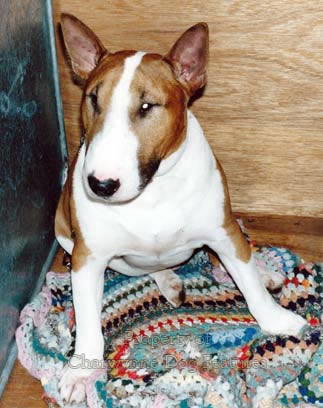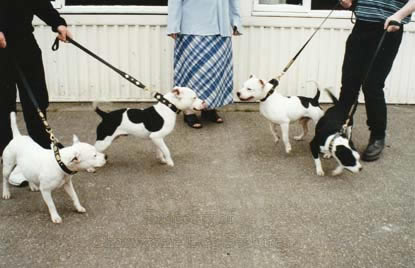124 UNPREDICTABLE GUNDOGS
UNPREDICTABLE GUNDOGS
by David Hancock
 Rottweilers have a reputation, a good one with those who know them, a sometimes scary one with rumour mongers. Towards the end of the last century, when Rottweilers were reported as misbehaving all over Britain, a letter-writer to The Times claimed that this was all very predictable and that dogs could display national characteristics too - going on to quote the famous service-dog trainer of the first part of this century, Lt Col EH Richardson. From his extensive experience of training war-dogs, not attack-dogs but messenger-dogs, ambulance-dogs and canine sentries, Colonel Richardson gave the view that nothing could beat our native breeds, especially the Airedale and farm collies. He used retrievers, spaniels and the odd Pointer too, using gamekeepers turned soldiers as trainers. After visiting Germany many times between 1900 and 1914 to study their police and military dog-training systems, he wrote that "...as in other forms of German organisation, not enough attention was directed to the psychology of the subject, and too much to the letter of mechanical instruction."
Rottweilers have a reputation, a good one with those who know them, a sometimes scary one with rumour mongers. Towards the end of the last century, when Rottweilers were reported as misbehaving all over Britain, a letter-writer to The Times claimed that this was all very predictable and that dogs could display national characteristics too - going on to quote the famous service-dog trainer of the first part of this century, Lt Col EH Richardson. From his extensive experience of training war-dogs, not attack-dogs but messenger-dogs, ambulance-dogs and canine sentries, Colonel Richardson gave the view that nothing could beat our native breeds, especially the Airedale and farm collies. He used retrievers, spaniels and the odd Pointer too, using gamekeepers turned soldiers as trainers. After visiting Germany many times between 1900 and 1914 to study their police and military dog-training systems, he wrote that "...as in other forms of German organisation, not enough attention was directed to the psychology of the subject, and too much to the letter of mechanical instruction."
With German gundog breeds now deservedly popular in Britain and pointers from Germany already outnumbering our native Pointer, are we directing enough attention to the "psychology of the subject"? Every breed has its breed characteristics, do breeds from a country exemplify its national characteristics? Colonel Richardson had clear views on this subject, writing that "The dogs of our race which have descended to us from these same fathers, have retained all the mental characteristics received from their masters, and one witnesses the knowledge of this in the behaviour of our typically British breeds when they are with their masters in alien lands ".
This statement may have pleased readers of his time rather more than those of today but does it actually withstand scrutiny? After all, according to hospital statistics, cross-bred collies and Jack Russells have been biting people almost as much as German dogs like Rottweilers and Alsatians. When I look at gundogs from Germany I see individual breed characteristics rather than common national ones. Unstable dogs can be bred in any country too, as our golden Cocker Spaniels and the American variety demonstrate. Are German breeds different from ours or is each German breed simply different from the next one? What is the behaviour of your typically German gundog like when it is with its British master in "alien lands"? Some British gundog writers have, until fairly recently, damned German gundogs with faint praise and occasionally revealed a prejudice against national origins.
One notably forthright gundog writer, the peerless Keith Erlandson, well known to readers and well qualified to cover the subject, was taken to task by more than one reader for producing an article in a weekly sporting magazine twenty years ago entitled "The Teutons". Predictably, he used slightly disparaging phrases such as "just what these German dogs get up to" and "the German dogs have their uses". But whatever German gundogs get up to and however different their purpose, I have yet to come across one behaving like a wayward Rottweiler; but Labradors and golden retrievers, and it saddens me to say so, are now listed among the breeds with serious problems of behaviour and temperament. These British gundogs rarely get headlined for savage attacks as Rottweilers have in the recent past, but the clear statistical evidence on their aggressive displays is a matter of serious concern. The public are not entirely surprised when a nine-stone guard dog attacks someone, such a breed is expected to have an edge to its performance and has been bred to be wary of strangers. But a gundog is associated with a gentler nature, a friendlier outlook and a soft use of mouth. A savage gundog can therefore be rather more dangerous to children who want to pat it or neighbours who are content to let their pet dog approach it.
Dr. Roger Mugford, the distinguished consultant in animal behaviour, compiled a table of his cases involving dogs with serious problems of aggression. It showed that of Britain's most popular four breeds, three topped the league for unwanted aggression; two of them were gundog breeds, the Labrador and the red-gold cocker spaniel. But the golden retriever came sixth and the Irish setter eleventh; the Dobermann came twelth. The savage unpredictable behaviour found in far too many golden cocker spaniels has been traced back to four show champions which were extensively bred from and their offspring exported. Thirty years ago when I was researching their native breeds in Portugal, a local dog owner complained bitterly about his "English spaniel" which had bitten his little daughter quite badly. I asked him if it had been a golden cocker and he looked surprised at my knowing not just the breed but the coat colour involved too. The "rage syndrome" has been known for some time in golden cockers but not often publicly acknowledged.
As Dr Mugford has scornfully pointed out: "Very little thought is given to the physical well-being or temperamental characteristics of pedigree dogs so long as their ears point in the right direction". Much of the aggression found in dogs is rooted in fear--perhaps in humans too! The Germans used to label such dogs on their show benches with the warning notice "Angstbeisser" or biter from anxiety. The honorary secretary of the British Veterinary Association once stated that: "If the judges at dog shows, when they see a nervy, snarly dog, no matter how beautiful, said, 'Sorry, we're not looking at him', that would be the end of it." But of course show ring judges lack the moral fibre to do just that and so "angstbeissers" win prizes and are bred from. Dr Malcolm Willis, the leading canine geneticist in this country (once foolishly expelled from membership of the Kennel Club) has stated that "The Kennel Club could force judges to be more careful about character but they don't. When they say they can't do anything, it means they don't want to do anything." The Kennel Club expects breeders to shoulder all responsibility and impose discipline on themselves. But just as the KC needs registration fees income, breeders need puppy sales and stud-fee income. The owner of a golden retriever stud dog was once informed that his dog carried and transmitted an inherited disease affecting the brain; he refused to cooperate with his own veterinary surgeon, who, quite naturally, wished to contain the disease. The veterinary surgeon is under no legal obligation to report such an incident and all this stud dog's progeny can be registered with the KC. Who is going to stop such human madness?
Once they reach sexual maturity, bitches can have two litters a year. If a bitch with a genetic defect has only four offspring a year, of which half are female, she could produce (and infect) well over 4,000 descendants in only seven years. Since show champions are not checked for behavioural defects and extensively bred from, we are creating wholly undesirable and quite needless problems for future dog owners. We say we love our dogs but surely we really do love our children; who is protecting them from dogs bred to a cosmetic design but not for mental stability? Unpredictable unstable Rottweilers are produced by irresponsible breeders but so are unreliable golden cockers and the general public don't know. A dog's pedigree and its registration with the Kennel Club is simply meaningless in terms of quality.
Battersea Dogs' Home receive over 600 abandoned gundogs each year. We know that a quarter of all dogs taken to vets for destruction are taken there for behavioural reasons. How many of the abandoned gundogs had behavioural problems? Inherited behavioural problems can destroy the reputation of a breed faster and more lastingly than any inherited physical defect, as Rottweiler breeders have learned to their cost, (10,000 registered in 1989, under half that number in 1998 and around 6,500 a year more recently). If we really care about dogs, the remedy is simple: all stud-dogs with suspect temperament must be castrated, all breeding bitches with suspect temperament must be speyed. The Kennel Club must deregister any pedigree dog guilty of biting someone in unjustifiable circumstances and its past progeny, not just its future offspring. Sadly I cannot see that happening.
It is a noticeable feature of statistics on breeds afflicted by hereditary defects that the most popular ones head the incident list proportionately and the less numerous breeds feature the least. In a wide-ranging Canadian study, golden retrievers were 7th in the list of most-afflicted breeds and 6th in the popularity stakes. Least cited breeds were the German pointers, Welsh Springers, wire-haired Vizslas and Field Spaniels, none of which are over-bred. The same survey indicated that problems of temperament in Labrador and Golden Retrievers were far more prevalent than in the much less popular Curly-coated Retriever. Problems of temperament in English Springers, Irish and English Setters were far worse than in the less numerous Clumber Spaniel.
Dr. Victoria Voith from the USA, who has studied mental illness in companion animals, has linked boredom and lack of employment with unacceptable aggression in dogs. Disturbed dogs which wreck the interior of cars could be fighting boredom. A potential pack-leader lacking exercise may try to impose his will on members of his human family out of pent-up frustration. Both types need the working outlet to expend unused energy and undoubtedly have a spiritual need to carry out the function in the field they were purpose-bred to fulfil. Is it therefore fair to have as a companion-breed a gundog which is never ever required to work ? Is it reasonable to buy a powerful energetic 'supercharged' Labrador with field trial champions behind it only for it to spend most of the day sitting on a doormat outside a suburban house ?
Forty years ago when I was working in Germany, the little German dog of one of my many German neighbours was savagely killed by the big English dog of one of my few English neighbours. The latter dog was a black Labrador--with hard, cruel eyes and the head of a Rottweiler. Relating this does not diminish my admiration for the breed of Labrador. Breeds don't misbehave; individual dogs do, partly through their breeding and partly through their upbringing and lifestyle. We can do something about all three if we address this problem. But, as usual with dogs, it'll end up being someone else's problem. I am constantly amazed when highly intelligent parents go out and buy a puppy to live with their family without one single check on its likely temperament. Such parents can spend hours verifying the safety features of the next car; both cars and dogs can harm children if safety checks are not made. We are all being far too complacent about the temperament of our gundog breeds - with their energy and softer looks they can pose a bigger threat.